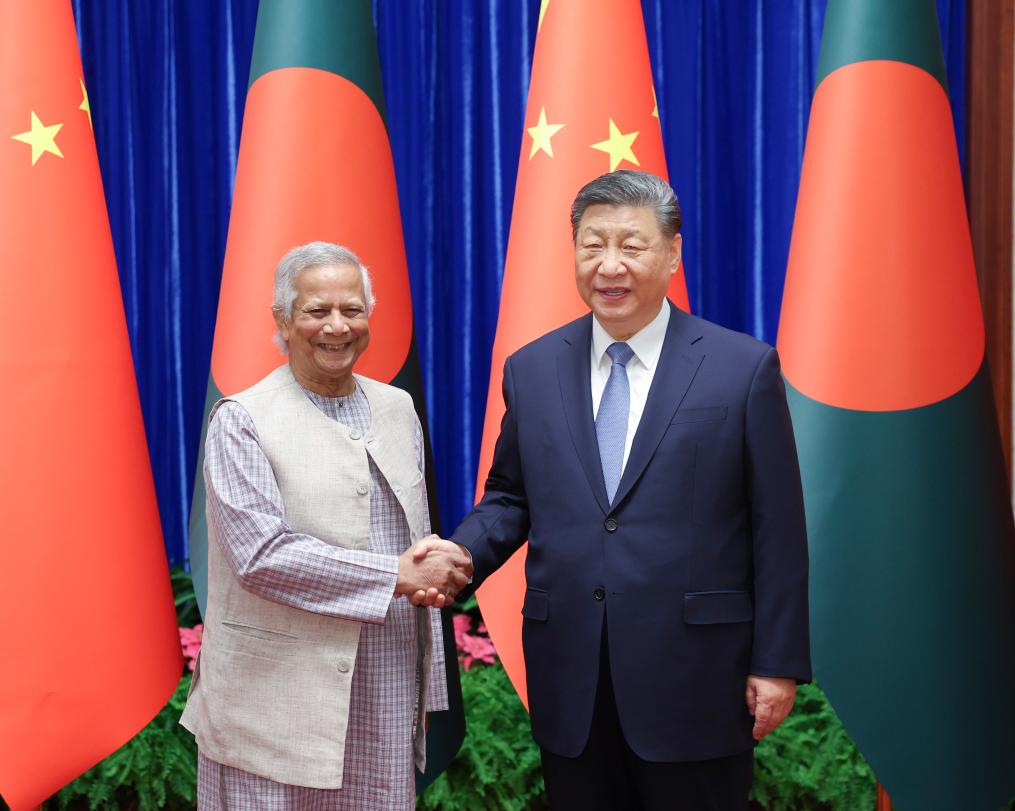The official visit of Mohammed Yunus to China in late March proved fruitful, but there remain many untapped opportunities for cooperation between the countries of South Asian and China. As China brings technological advantages and investment opportunities, South Asia will develop faster and better.

Chinese President Xi Jinping meets with Bangladeshi interim government's Chief Adviser Muhammad Yunus at the Great Hall of the People in Beijing, capital of China, March 28, 2025. (Photo: Ding Haitao)
The 50th anniversary of diplomatic relations between Bangladesh and China gained momentum during the four-day official visit to Beijing of Mohammed Yunus, chief adviser from Bangladesh, in late March. China established diplomatic relations with Bangladesh in 1975, and the relationship has grown stronger over the years, particularly in the areas of infrastructure development and trade cooperation. Given the current global power distribution, Yunus must forge significant partnerships with Beijing, as the regional balance between China and South Asia remains complex.
By facilitating the advancement of massive infrastructure projects throughout Bangladesh, China can solidify its position as an essential development partner for the nation via the Belt and Road Initiative. Multiple large infrastructure initiatives have been propelled by collaboration, reshaping the country’s economic system and infrastructure framework.
The Padma Bridge Rail Link Project aims to create better connections between the city of Dhaka and southwestern areas of Bangladesh to boost both trade and transportation systems. One new development is the Karnaphuli Tunnel, South Asia’s first underwater expressway tunnel, which will enhance transportation networks across Chittagong and enable economic growth in the port city.
The Dhaka-Ashulia Elevated Expressway provides solutions for traffic jams, while making improvements to urban transportation within the capital area. Power projects initiated with Chinese investment form an integral part of China’s activity in Bangladesh’s energy sector and support rising domestic energy needs. China is building 21 bridges across the national landscape to strengthen regional connections and boost economic development.
The ambitious projects demonstrate China’s strengthening bond with Bangladesh, which involves sustainable development and economic and regional integration. Unfortunately, political turmoil within Bangladesh has led to a temporary freeze of the close relationship between both nations.
When the new interim government took control in 2024 it introduced a different scenario for China, so the visit to China by Yunus is significant. It will inspire China to review its funding and working relationships as it steps up its expansion strategy in South Asia through its BRI. Bangladesh is a significant partner.
Yunus’s visit to China garnered significant worldwide interest, as it reinforced diplomatic relations and signaled the emergence of a new, evolving regional power dynamic. The implementation of seven memorandums of understanding — centered on technology — between Bangladesh and China will formalize advancements in diplomatic ties that will impact the future of South Asia. Yunus has concentrated his efforts in China on the transfer of modern technologies within the healthcare, digital economy and agricultural sectors.
To enhance relations, the governments of China and Bangladesh have signed seven new agreements that broaden their collaboration beyond the BRI infrastructure initiative into technical domains. Bangladesh has established a robotics practice center that uses Chinese healthcare technology to enhance medical services and solidify its status as a premier medical hub. The program showcases China’s technological soft power while providing immediate advantages to Bangladesh.
Collaborations of 5G, AI and fintech within the digital economy indicate that Bangladesh is participating in the Fourth Industrial Revolution. The expertise and resources provided by China, a global leader in several domains, are invaluable. The digital transformation of Bangladesh can be accelerated through such fields of collaboration, which build enhanced network connectivity and financial solutions for industry.
The rapid development of AI and other digital technologies presents emerging countries such as Bangladesh with both significant potential and formidable difficulties. Because of its robust infrastructure and extensive technical expertise, China has eclipsed all other nations to emerge as the world leader in several technological domains. Bangladesh can modernize its economic sectors via collaboration with China to develop digital infrastructure, implement e-governance using artificial intelligence across diverse market sectors and facilitate technology transfers.
AI-powered collaborations between entities have substantial capability to enhance government systems, educational structures and disaster response operations. By working together in the fintech space, Bangladesh can update its banking system to provide better financial services to all of its customers.
The government of Bangladesh has brought food security, together with agricultural productivity advancements, to forge its enduring top goal of optimizing agricultural modernization schemes for national targets. Through precision irrigation technology and crop mixtures, youth technology programs from China provide major advantages to Bangladesh’s farming sector. The collaborative projects will help agricultural yields rise while minimizing dependency on imports and creating enhanced economic opportunities for farmers.
China has become a significant economic partner for Bangladesh. The BRI projects, in which China spent around $10 billion, have had a significant impact on Bangladesh’s economy. To become a middle-income country and maintain economic growth, infrastructure improvements in the transportation, energy and communication sectors are crucial. Infrastructure development partnerships tend to favor China because its significant investments proceed at an efficient pace.
Yunus’s China visit is historic because of its implications for South Asia diplomatic relations. Bangladesh’s future relationship with China depends on win-win cooperation, while maximizing beneficial tech partnerships and the active development of multiple international relationships.
Yunus’s visit to China proved fruitful, but there are many untapped opportunities for cooperation between the countries of South Asian and China. China is a global leader in high-tech and innovation, and South Asia is actively participating. With China’s technological advantages and investment opportunities, South Asia can develop faster and better.